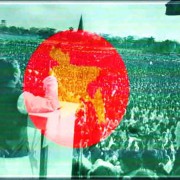Bangabandhu “Greatest Bengali of All Time”
Listeners of the BBC’s Bengali service have voted Bangladesh’s first president, Sheikh Mujibur Rahman, the “Greatest Bengali of All Time”.
Sheikh Mujibur, assassinated in 1975, easily beat Nobel prize-winning poet and playwright Rabindranath Tagore.
Another Nobel laureate, economist Amartya Sen, was the only living person in the top 20 at number 14.
He was one place behind Satyajit Ray, director of classic films such as Pather Panchali and the Chess Players.
Sheikh Mujib, popularly known as Bangabandhu or Friend of Bengal, is credited by many with leading Bangladesh to independence from Pakistan in 1971.
The former Bangladeshi president was one of numerous politicians to figure prominently in the poll, including General Ziaur Rahman, the assassinated husband of the present prime minister.
Tagore is revered widely – regarded by many as the Bengali Shakespeare – and is the composer of both the Indian and Bangladeshi national anthems.
In the survey, popular fascination with poetry and rebellion was reflected in the listeners’ choice for number three – Kazi Nazrul Islam, a firebrand poet who was jailed by the British for writing subversive verses.
Still revered by Bengalis as the Rebel Poet, Nazrul Islam also composed hundreds of love songs and religious chants.
The radio survey was conducted over February and March, when listeners were asked to nominate their five greatest Bengalis.
The Bengali Service announced the names through a countdown over 20 days, starting on 26 March – Bangladesh’s independence day – and ending on Bengali New Year’s Day on 14 April.
The survey put only one woman in the Top 20, Rokeya Sakhawaat Hossain, at number six.
Reformers and revolutionaries
Hossain, popularly referred to as Begum Rokeya, risked social wrath and isolation at the turn of the 20th century, by pioneering education for Muslim women in Bengal.
The top 20 was peppered with names of reformers and revolutionaries – Subhash Chandra Bose, who led an abortive armed rebellion against British rule during World War II, came in at number five.
Social reformer and educationist Ishwar Chandra Viddyasagar, who sought to break down caste barriers in Hindu society, came in at number eight.
A 19th Century rebel against British rule, Mir Nisar Ali Titumeer, came in at number 11.
But not everyone on the list is a poet or a politician, with listeners voting scientist Jagadish Chandra Basu into number seven. He is credited with ground-breaking work on the life cycle of plants.
The BBC’s Bengali service has nearly 12 million listeners in Bangladesh and eastern India, home to some 250 million Bengali-speakers.
The survey produced well over 100 names, and the top 20 was compiled on points awarded according to listeners’ order of preference.
Listeners name ‘greatest Bengali’
By Sabir Mustafa
BBC Bengali editor








